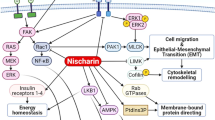Abstract
To gain insight into the role of gene expression alterations in breast cancer progression, we conducted a comprehensive gene expression analysis of a series of cell lines derived from MCF10A, which include benign MCF10A cells, premalignant AT, and malignant CA1a tumor cells. We analyzed gene expression variation using the Agilent Human Genome Oligo Microarray with the goal of identifying gene-specific expression change events. In addition to a previously noted overexpression in oncogene MDM2, HRAS, and PCNA, our studies identified overexpression of Wnt signaling pathway in malignant breast cell lines. The Kaplan–Meier plot showed that high c-Myc expression in breast cancer was associated with tumor progression and the patient’s poor survival. This study showed that the Wnt pathway has further provided a basis for the development of potential biomarker for breast cancer prognosis.





Similar content being viewed by others
Reference
Al-Hajj M, Wicha MS, Benito-Hernandez A, Morrison SJ, Clarke MF. Prospective identification of tumorigenic breast cancer cells. Proc Natl Acad Sci USA. 2003;100:3983–8.
Kadota M, Yang HH, Gomez B, Sato M, Clifford RJ, Meerzaman D, Dunn BK, Wakefield LM, Lee MP. Delineating genetic alterations for tumor progression in the MCF10A series of breast cancer cell lines. PLoS One. 2010;5:e9201.
Santner SJ, Dawson PJ, Tait L, Soule HD, Eliason J, Mohamed AN, Wolman SR, Heppner GH, Miller FR. Malignant MCF10CA1 cell lines derived from premalignant human breast epithelial MCF10AT cells. Breast Cancer Res Treat. 2001;65:101–10.
Dawson PJ, Wolman SR, Tait L, Heppner GH, Miller FR. MCF10AT: a model for the evolution of cancer from proliferative breast disease. Am J Pathol. 1996;148:313–9.
Strickland LB, Dawson PJ, Santner SJ, Miller FR. Progression of premalignant MCF10AT generates heterogeneous malignant variants with characteristic histologic types and immunohistochemical markers. Breast Cancer Res Treat. 2000;64:235–40.
S. Iravani, L. Mora, F.R. Miller, P.J. Dawson (1998). Altered expression of c-erbB-2, DF3, b72.3, p53 and Ki-67 with progression and differentiation to two distinct histologic types of invasive carcinoma in the MCF10AT human xenograft model of proliferative breast disease. Int J Oncol 12: 369–375.
Sadlonova A, Mukherjee S, Bowe DB, Gault SR, Dumas NA, Van Tine BA, Frolova N, Page GP, Welch DR, Novak L, Frost AR. Human breast fibroblasts inhibit growth of the MCF10AT xenograft model of proliferative breast disease. Am J Pathol. 2007;170:1064–76.
Gyorffy B, Lanczky A, Eklund AC, Denkert C, Budczies J, Li Q, Szallasi Z. An online survival analysis tool to rapidly assess the effect of 22,277 genes on breast cancer prognosis using microarray data of 1809 patients. Breast Cancer Res Treat. 2010;123:725–31.
Reya T, Clevers H. Wnt signalling in stem cells and cancer. Nature. 2005;434:843–50.
Brekman A, Singh KE, Polotskaia A, Kundu N, Bargonetti J. A p53-independent role of Mdm2 in estrogen-mediated activation of breast cancer cell proliferation. Breast Cancer Res. 2011;13:R3.
Watters JW, Roberts CJ. Developing gene expression signatures of pathway deregulation in tumors. Mol Cancer Ther. 2006;5:2444–9.
Zhao H, Ho PC, Lo YH, Espejo A, Bedford MT, Hung MC, Wang SC. Interaction of proliferation cell nuclear antigen (PCNA) with c-Abl in cell proliferation and response to DNA damages in breast cancer. PLoS One. 2012;7:e29416.
Xiong WJ, Hu LJ, Jian YC, Wang LJ, Jiang M, Li W, He Y. Wnt5a participates in hepatic stellate cell activation observed by gene expression profile and functional assays. World J Gastroenterol. 2012;18:1745–52.
Malhotra S, Kincade PW. Wnt-related molecules and signaling pathway equilibrium in hematopoiesis. Cell Stem Cell. 2009;4:27–36.
Staal FJ, Luis TC, Tiemessen MM. WNT signalling in the immune system: WNT is spreading its wings. Nat Rev Immunol. 2008;8:581–93.
Huelsken J, Behrens J. The Wnt signalling pathway. J Cell Sci. 2002;115:3977–8.
Wend P, Holland JD, Ziebold U, Birchmeier W. Wnt signaling in stem and cancer stem cells. Semin Cell Dev Biol. 2010;21:855–63.
S. Yoshioka, M.L. King, S. Ran, H. Okuda, J.A. 2nd MacLean, M.E. McAsey, N. Sugino, L. Brard, K. Watabe, K. Hayashi (2012) WNT3a regulates tumor growth and progression in ovarian cancer through the WNT/β-catenin pathway. Mol Cancer Res 10: 469–482.
Acknowledgments
We are indebted to Dr. Yang Wang and Dr. Xiaoping Zhang for their valuable advice and support.
Conflicts of interest
None
Author information
Authors and Affiliations
Corresponding authors
Additional information
Yu-Zhou Wang, Yu-Song Han, and Yu-Shui Ma contributed equally to this experiment.
Rights and permissions
About this article
Cite this article
Wang, YZ., Han, YS., Ma, YS. et al. Differential gene expression of Wnt signaling pathway in benign, premalignant, and malignant human breast epithelial cells. Tumor Biol. 33, 2317–2327 (2012). https://doi.org/10.1007/s13277-012-0494-0
Received:
Accepted:
Published:
Issue Date:
DOI: https://doi.org/10.1007/s13277-012-0494-0




